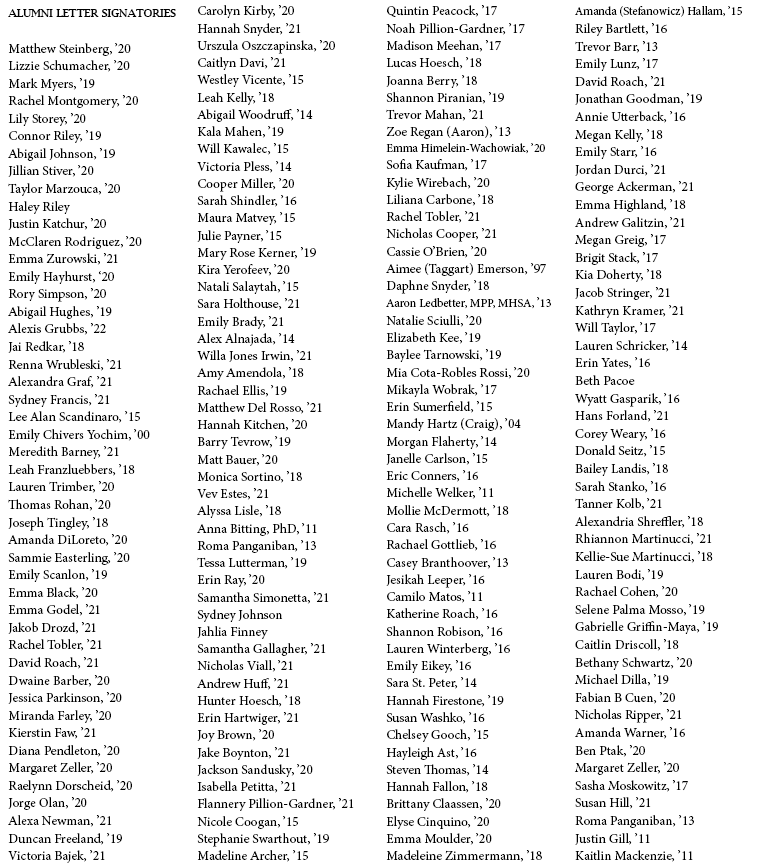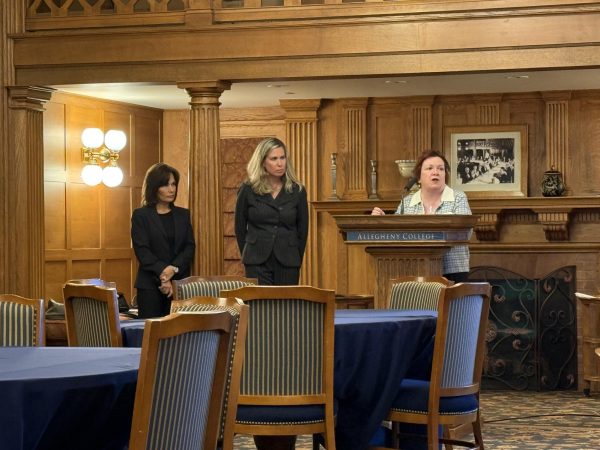Alumni petition Link, Chair Feeley, to ease staff and faculty reductions
The 198 signatories to the letter when it was sent on Jan. 18. At least two more alumni have signed the petition, for a total of 200 signatories.
As Allegheny students returned for the first class of module one on Jan. 18, almost 200 alumni sent an open letter to President Hilary Link and Chair of the Board of Trustees Mary Feeley, ’78, expressing concern over the July 2021 elimination of 36 staff positions at the college, which included the firing 24 employees and removing 12 vacant positions from the staff roster.
“Terminating staff and faculty positions sends the message that Allegheny is abandoning one of its core principles as a liberal arts institution: faculty-student connections,” the letter reads.
According to Matthew Steinberg, ’20, who co-wrote the letter with Kelsey Evans, ’20, the letter has been in the works since August of last year, and received the bulk of its signatures in the months of September and October.
“I didn’t just want to send it in the middle of the fall because I knew that the task force was still working through their future plans, and they hadn’t quite come to fruition at that point in the fall,” Steinberg said. “We just wanted the correct timing and right at the start of this semester seemed like a good time.”
The letter comes just under two weeks before the draft staffing plan will be sent to college faculty pending final approval from the Board of Trustees. The plan will be sent to the faculty on Jan. 31, with a final vote from the Board expected at their meeting on Feb. 5 or 6.
Vice President for Enrollment Management Ellen Johnson maintained that the college’s position has not changed since the July eliminations
“We are working to prepare ourselves to be an institution of the future,” Johnson said. “We know we’re a smaller institution and we want to ensure that we can fully balance our commitment to our students that are here and our strong financial future. Our position is still that and hasn’t changed the decisions that were made back in July.”
The unchanged decisions have withstood harsh student criticism, an aspect of this process that Allegheny is not alone in. At Ithaca College in New York, alumni started a website for lodging complaints against that college’s Academic Program Prioritization process. Almost 2,500 alumni from Adrian College in Michigan, a school roughly the size of Allegheny, rallied to save almost a dozen faculty members from being laid-off. Across the country, other schools have faced criticism for their management of collegiate finances and aggressive layoffs in the liberal arts.
Allegheny’s shared governance system has taken a prominent role in community feedback on the current plans for staffing changes. Students voiced their concerns at Allegheny Student Government General Assemblies. The Academic Program Review Task Force, whose December report laid out broad staffing recommendations, was created by Faculty Council — a body of faculty elected by their peers to represent them.
Even staff and administrators have shared governance bodies in the form of the Staff Advisory Council (for non-exempt workers paid an hourly wage) and the Administrative Advisory Council (for exempt workers paid a fixed salary). According to a MyAllegheny post from Nov. 14, 2021, the two committees have discussed merging to form a single staff council to enhance staff representation, though the merger has not formally taken place.
But the alumni do not have the same representation within shared governance.
“Alumni do have the opportunity to work through our Office of Institutional Advancement and through their connections on campus with faculty and staff that are here to share their thoughts about the college as well, but they do not have a formal role in shared governance,” Johnson said.
Institutional Advancement oversees Alumni Affairs and Donor Relations. While Steinberg noted that donations can be a big way for alumni to push the colleges to focus on specific priorities, he also estimated that 90% of signees had graduated since 2010.
“We’re young alumni,” Steinberg said. “(For example), I graduated two years ago (and) I guess that’s something we don’t know how to navigate.”
Though the administration’s position has not changed, Johnson welcomed the alumni’s letter and seemed open to working further with them.
“It’s way better to have passionate alumni that share that than people who don’t care,” Johnson said. “I think to continue to build those relationships so that there’s opportunities to share that where they don’t feel like they have to submit a petition but have that ongoing relationship with the college.”
On the other hand, Steinberg feels that the alumni letter is the product of a productive and healthy relationship.
“We’re trying to maintain a productive relationship by speaking our minds and speaking up for the employees of Allegheny College,” Steinberg said. “That’s what I view as being important.”
Steinberg also encouraged current students to keep speaking out if they do not agree with the college’s decisions
“Keep speaking your mind in any way that you can,” Steinberg said. “I do see the ASG meetings and I know that … those environments can be hostile and can be perceived as negative and stressful. But I would encourage students, no matter how heated the discussion gets, to just keep on pushing for what they know is right.”
Johnson noted that the staffing plan still has to be approved by the Board of Trustees, and will still need to be implemented by Provost Ron Cole, ’87, and the new provost, who has yet to be named.
“There’s so much more to this process to come over the next couple of weeks,” Johnson said. “The staff positions — that hasn’t changed, that happened back in July, so now it’s really the next steps in the process.”
Steinberg has left the letter open for other alumni to sign if they so choose.

Sami Mirza is a senior from many different places. He is majoring in International Studies with a focus on the Middle East and North Africa and minor in...











Al Coppolo ‘78 • Feb 18, 2022 at 3:42 pm
I guess we know Ron’s role is changing. Just read the Haddad announcement from Hilary. Not sure how she could have been more insensitive and cold-shouldered. Particularly in light of the work Ron recently completed on the faculty/curriculum resizing plan. I would have expected at least some expression of appreciation, recognition, and thanks for Ron’s contributions. Hilary talks about the “Allegheny Community” this does not feel like the “community” I recall.
Al Coppolo • Jan 29, 2022 at 7:20 am
Second to last paragraph, Ellen Johnson makes the parenthetical comment about a new provost … is Ron Cole going somewhere?
Al Coppolo ‘78